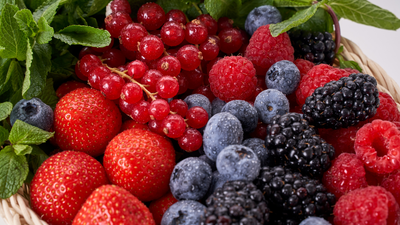Are Vegan and Vegetarian Diets Safe During Pregnancy and Lactation?
Are Vegan and Vegetarian Diets Safe During Pregnancy and Lactation?
by Katie Black
Vegan and vegetarian diets are traditionally associated with people’s concerns about animals suffering inhumane conditions, but have recently become more popular as awareness increases about the impact of industrial animal agriculture on our climate and personal health.
But for breastfeeding or expecting mothers whose priority is, of course, the health of their child, adhering to a vegetarian or vegan diet may not seem like a viable option. The nutritional adequacy of the breast milk from vegan or vegetarian mothers is often called into question and in some countries donor-milk banks will not even accept milk from these diets. This is largely due to conceptions about differences in fatty acid levels and micro-nutrients such as vitamin B-12.
“Vitamin B-12 is essential for a baby’s brain and blood cell development and a deficiency can lead to a whole host of neurological and other problems.”
Previously there has been little information published regarding the effect a vegetarian or vegan diet has on breastmilk, but as these diets gain popularity we now have far more research on this subject.
Vitamin B-12 is essential for a baby’s brain and blood cell development and a deficiency can lead to a whole host of neurological and other problems. Fatty acids are essential for their growing nervous system, retinal (visual) development, and physical growth among multiple other functions.There are many case reports citing deficiencies in vitamin B-12, fatty acids, and other nutrients in vegan and vegetarian mothers. However, recent systematic reviews that minimize bias show that there is not as much cause for concern as traditionally believed.
In a systematic review published in 2019 in the Netherlands (a country which currently does not accept breastmilk donations from vegan or vegetarian diets), researchers set out to determine whether this exclusion is appropriate, or if these diets can, in fact, provide adequate nutrition.
Twelve studies were included in the review totaling 478 participants. Diets that were not either omnivorous, (all inclusive), vegetarian, (meatless) or vegan, (no animal products of any kind), were excluded.
Five of the studies reported higher concentrations of unsaturated fats in the milk of vegans and vegetarians, and higher concentrations of saturated fats in the milk of omnivores. Unsaturated fats may encourage heart health and are generally considered to be healthier than saturated fats which are commonly found in red meat, chicken skin, butter, and whole fat dairy among other often animal-based foods.
Unsaturated fats can be broken down into two main types: monounsaturated and polyunsaturated. Monounsaturated fats can be found in avocados, olive oil, some nuts, other plant based foods. Polyunsaturated fats can further be broken down into omega-3’s and omega-6’s. Your body cannot produce these types of fats on its own and must be sourced from diet alone, thus it is essential to consume the right amounts for you and your baby’s health.
The total amount of omega-3’s were higher in the milk of vegan and vegetarian mothers compared to omnivores. The average American diet contains far too many omega-6 fats in comparison with omega-3’s, increasing the chance of developing inflammatory diseases. The best way to remedy this is not by decreasing your intake of healthy omega-6 fats, rather incorporating more omega-3’s into your daily diet.
Some of the best sources of omega-3 fatty acids are flax, sunflower, chia and hemp seeds, soybeans, walnuts and fatty fish, while the best sources of omega-6’s are vegetable oils such as canola, safflower, soybean, sunflower and corn among others.
As for vitamin B-12, it is sourced almost exclusively from good bacteria in the large intestine of animals and as a result very difficult to acquire from anything other than animal-based products. It is one of the biggest concerns for nutritional adequacy in vegetarians and vegans, especially. One study assessing the diets of almost 700 participants recorded a deficiency in vitamin B-12 in 7% in vegetarians, and over 50% in vegans.
In the systematic review, concentrations of vitamin B-12 were definitely lower for some vegan and vegetarian mothers, however for those who used supplements, their levels were comparable to the levels in the milk from participants with omnivorous diets. The researchers suggested that milk-donor banks should accept milk from vegans or vegetarians but only if the donor supplements her diet adequately.
Whether your diet is omnivorous, vegetarian, vegan or something else altogether, it is vital that both during pregnancy and lactation you and your little one are getting enough essential nutrients to minimize the detrimental and often irreversible effects of a deficiency. It is very important to talk to your healthcare provider and/or a qualified lactation consultant to analyze what type and amount of supplementation to take if needed. If you have concerns about your diet, you can book a telehealth appointment with an MD, CLC or RDN directly on our website.
There is no one-size-fits-all when it comes to diet and lactation. Finding what works for you and the diet you are comfortable following should be a priority to ensure a happy and healthy mother and child.
Sources:
https://academicguides.waldenu.edu/library/healthevidence/evidencepyramid
Carol L Zeuschner, Bevan D Hokin, Kate A Marsh, Angela V Saunders, Michelle A Reid and Melinda R Ramsay, Vitamin B12 and vegetarian diets. Med J Aust 2013; 199 (4): S27-S32. || doi: 10.5694/mja11.11509
Koppens, Hugo, J.B. van Goudoever, Comparing Breastmilk Composition of Vegan, Vegetarian and Omnivorous Women: A Systematic Review. October, 2019, https://d15cj4q5z7qveo.cloudfront.net/app/uploads/2019/12/Thesis-Hugo-Koppens-2.pdf
Perrin, M.T., Pawlak, R., Dean, L.L. et al. A cross-sectional study of fatty acids and brain-derived neurotrophic factor (BDNF) in human milk from lactating women following vegan, vegetarian, and omnivore diets. Eur J Nutr58, 2401–2410 (2019). https://doi.org/10.1007/s00394-018-1793-z






